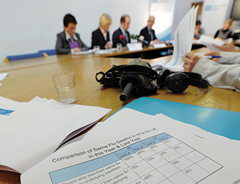Handling communications in a crisis
 Health agencies are constantly in the headlines and their press offices have an important role in keeping the public informed.
Health agencies are constantly in the headlines and their press offices have an important role in keeping the public informed.
Careful planning, clear messages and investing time in getting to know stakeholders can all help when handling a public health crisis, two communications managers have told agendaNi’s crisis communications seminar.
Margaret Mulholland is the Northern Health and Social Care Trust’s head of communications and Margery Magee is the Public Health Agency’s communications manager.
Its senior management team in the Northern Trust meets weekly to look out for potential crises. Sources include freedom of information requests, Assembly questions, inquiries from the media and complaints.
In early 2010, the trust became aware that it needed to close A&E units at Whiteabbey Hospital (near North Belfast) and Mid Ulster Hospital (in Magherafelt) for safety reasons. The trust developed a communications plan to make sure that all relevant stakeholders were informed. However, the Health Service was also moving into purdah, the pre-election period. Policy announcements are avoided at that time, due to the potential political consequences, and the Health Minister did not want “noise in the system”.
The trust’s two key messages were:
• acutely ill or injured patients must be admitted to hospitals that provide access to specialists, multi-professional teams, critical care, and clinical support services; and
• no compulsory job losses as a result of changes.
The trust aims to ensure that staff are informed prior to the media or public representatives. The story, though, was leaked and broke on 11 May. Staff briefings started at 11am the next day and information was simultaneously sent out by email and over the staff intranet. MLAs were then called.
A press release was distributed at noon and the story ran on the lunchtime news and into the evening. The trust continued to respond to interview bids on Thursday and Friday. It then took a decision that there was no further benefit, either to the trust or the area’s population, in keeping the story going as all the information had been provided. The trust therefore declined to arrange interviews from then onwards.
Magee joined the Public Health Agency during the swine ‘flu pandemic.
While a “media frenzy” ensued, the deaths of 4,000 people in Northern Ireland each year due to the effects of smoking received much less coverage.
The pseudomonas outbreak earlier this year was “particularly traumatic” for parents but the Minister and officials responded openly and honestly. The crisis involved 18 days of intense work on public health responses. All parents with children in neo-natal units across the province had to be told first, when meant that the media sometimes had to wait 36 hours for an update.
Communication staff in health organisations should consider public outrage and concern, empathise with the audience, and be truthful, honest, frank and open: “Just play it straight.” To make sure its messages are clear, the agency does not do off-the-record briefings.
It’s best to give people more information than less, to fill in any vacuums in their knowledge. The time after a crisis should also be seen as an opportunity to take stock, meet up with stakeholders, and grow your contact book.





